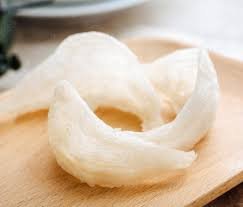Bird's Nest ( 燕窩 ) for Dry Cough and Skincare
Did you know that In traditional Chinese medicine (TCM), edible bird's nest is a health tonic that is believed to treat a variety of illnesses and promote longevity? Yes, it is a real bird’s nest, made from the saliva of swiftlets! These nests are created from solidified saliva, and are harvested for human consumption.
Beautifying
Chinese women have consumed bird's nest for centuries to improve their skin and complexion, and they are always in great demand for their skin beautifying benefits.
It is reputed to maintain youthfulness and enhance the complexion, and modern studies have shown that bird’s nest is rich in epidermal growth factor (EGF), which is responsible for skin and tissue repair. Bird’s nest is mainly glycoprotein which is about 70% collagen as well as calcium, sodium, potassium and carbohydrate. Some other major ingredients are essential trace elements such as phosphorus, iron, iodine and 18 of the 20 essential amino acids.
Dry Cough
Bird’s nest is particularly supportive for lung issues, including dry cough, asthma, tuberculosis and upper respiratory tract illnesses. It is phlegm-dissolving, cough-suppressing, and voice-strengthening.
Other conditions that bird’s nest has been used for include:
Preventing Cancer
Increasing bone mass and strength
Neurological and intellectual function development in infants
Curing general debility and asthenia
Speeding recovery from illness and surgery
Supporting healthy pregnancy
Bolstering immunity
Bird’s nests are among the most expensive animal products consumed by humans, with prices up to about $4,300 per pound, depending on grading (which depends on the bird species, as well as the shape and color of the nest). Indonesia currently produces about 80% of the world’s bird’s nest.
The most common preparation for consumption is bird's nest soup, a delicacy in Chinese cuisine. When dissolved in water, the bird's nests have a gelatinous texture utilized in soup or “sweet soup” (tong sui). It is mostly referred to as 燕窩 (yànwō) unless references are made to the savory or sweet soup in Chinese cuisine. In addition to their use in soup, edible bird's nests can be cooked with rice to produce bird's nest congee or bird's nest boiled rice, or they can be added to egg tarts and other desserts, or made into a steamed jelly.
Swiftlet Birds
Disclaimer: All above articles are for reference only. If patients are interested, please consult a professional practitioner Traditional Chinese Medicine for a consultation.




